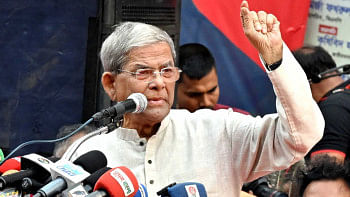Evidence shows 'deep IS' role in café massacre
Before Tamim Ahmed Chowdhury orchestrated Bangladesh's worst militant attack, he sought and won approval for it from Islamic State (IS).
A Canadian of Bangladeshi origin, he was told by his contact in the militant group, Abu Terek Mohammad Tajuddin Kausar, to target foreigners, according to a senior police official who has seen communications between the two men.
Tamim, located in Bangladesh at the time, proposed an attack on a Dhaka eatery frequented by expatriates.
On July 1, a group of gunmen stormed the Holey Artisan café in Gulshan, murdering 22 people, most of them foreigners, in an overnight siege.
The back-and-forth between Tamim, 30, and Kausar, 35, which includes drafts of articles later published in Islamic State magazines, has not been previously reported.
The police official declined to be named due to the sensitivity of the information. Reuters could not independently verify the contents of the communications.
In its Rumiyah magazine published after the café massacre, Islamic State claimed two dozen attacks in the country since September 2015. The claim could not be independently verified.
The government has said Islamic State does not exist in the country.
"These are all home-grown people," said Home Minister Asaduzzaman Khan, adding that the siege militants belonged to a new faction of JMB, a banned group he said had ties to the opposition Jamaat-e-Islami party.
FUNDING AND RECRUITING
Bangladesh police first came to know about Tamim last year, but they did not know his whereabouts, the police official said.
In December, Dhaka police seized about 3.9 million taka ($50,000) destined for a close associate of Tamim's.
The money, which the police official said was sent via the informal hawala cash transfer network, came from a UK-based company. The company's founder, Sujan, was killed a few days later in Syria.
At the time, investigators could not establish the money had been sent on Islamic State's instructions, the police official said.
Tamim's group, meanwhile, was recruiting.
Tanvir Kaderi and his wife, Abedatul Fatema, had a comfortable middle-class life in Dhaka, with two children and steady jobs.
"We were a very happy family," Kaderi's son Mohammed Tahrim Kaderi Abir wrote in a confession presented before a magistrate.
Abir, an eighth grade student, wrote that his parents' behaviour started to change after they went on the hajj pilgrimage in 2014.
Kaderi started spending time with acquaintances from the local mosque, who introduced the family to others, including associates of Tamim.
They in turn preached to the family about faith and jihad and showed them videos of the war in Syria. One gave them a copy of Dabiq magazine, an Islamic State publication, according to the confession.
The preparations for the café attack began at least as early as June, around the beginning of Ramadan, according to Abir's confession. Kaderi rented an apartment in Bashundhara area, near the cafe.
A few days later the five militants who conducted the attack showed up at the house. Kaderi's family moved to Dhaka's old city the night of the raid.
MAGAZINE INTERVIEWS
Tamim was killed on August 27. That and the other raids gave police access to his correspondence with Kausar.
In one, Tamim was asked by Kausar to answer questions for an interview, which was eventually published in Dabiq in April under the nom de guerre Abu Ibrahim al-Hanif.
Al-Hanif was identified in the magazine as head of Islamic State in Bangladesh.
In another, Tamim sent the draft of an article about the café attack, which was published after his death in Rumiyah magazine, the police official said.
Kausar's mother said he moved to Australia in 2006 and she had not heard from him since before the attack. Tahera Begum, who lives in a town 135 miles from Dhaka, said she did not know whether he had links with Islamic State.
Before his death, Tamim made Kaderi the new point of contact with Kausar, the police official said.
At around 7:30pm on September 10, police knocked on the door of Kaderi's apartment, where his wife, one of his sons and some associates were hiding.
In the ensuing chaos, police were attacked with grenades and knives, while some women in the apartment threw chili powder at them. Kaderi ran into a room.
By the time the raid was over, Kaderi had slit his own throat. The last known link to Islamic State in Bangladesh was dead, although the police official said they did not know if anyone else was in contact with the militant group.
In an email, Maqbul Ahmad, the head of Jamaat-e-Islami, denied any connections with JMB or other militants.

 For all latest news, follow The Daily Star's Google News channel.
For all latest news, follow The Daily Star's Google News channel. 



Comments